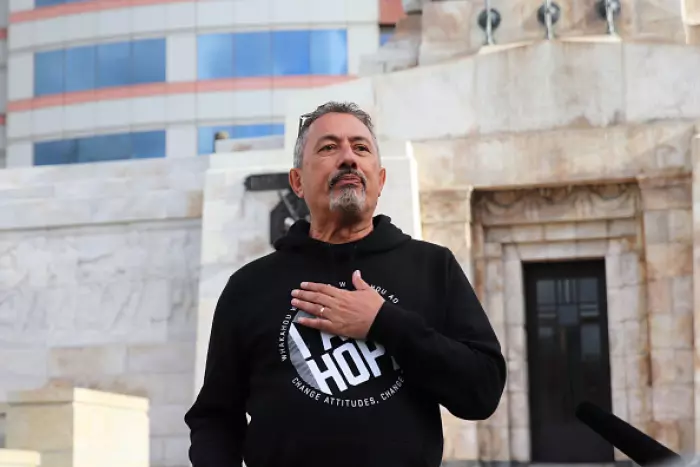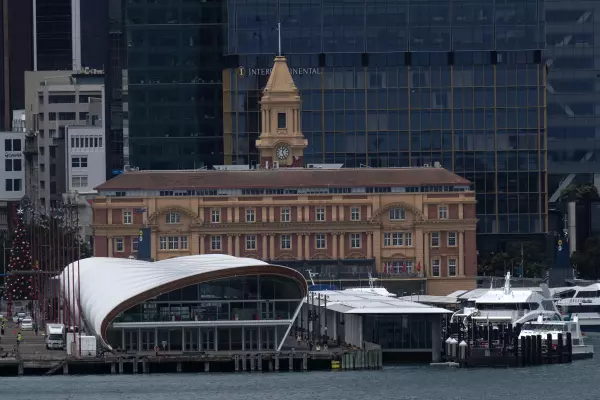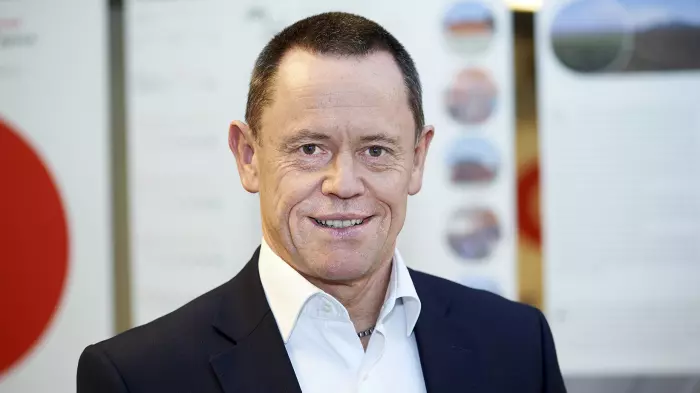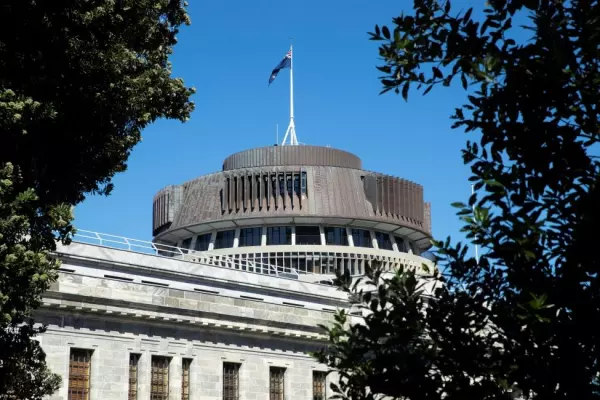Procurement sometimes gets political. In the first of a two-part series, BusinessDesk has the inside story of how Gumboot Friday got public money despite its services not meeting the Ministry of Health's clinical requirements.
For months, Mike King, the former comedian turned mental health campaigner, had been in the media castigating the government and the Ministry of Health. There was a growing perception that, despite record investment, the government was failing to deliver enough mental health support.
King was a leading critic. In 2019, the same year King was named New Zealander of the Year, his Key to Life Trust charity launched Gumboot Friday: a platform linking young people with free counselling funded by donations.
Throughout the first half of 2021, King repeatedly attacked the ministry and the government for not funding Gumboot Friday. In the background, his associates were lobbying the ministry and the minister for money. But the ministry wasn’t playing ball.
On June 30, a high-ranking health ministry manager, Jo Chiplin, sent an email to a Gumboot Friday associate reiterating her comments from an earlier meeting: the ministry wasn’t in a position to fund the service or any other charity outside its planned funding rounds, she said.
“This is to ensure a transparent, fair and equitable process and to ensure robust evaluation processes so that we can be confident we are funding clinically safe and effective services that meet the needs of the population they are serving.”
In July, Prime Minister Jacinda Ardern was grilled by the AM Show's then-host Duncan Garner about why her government hadn’t funded the service.
“To be fair to everyone else who’s working in the mental health space, they don’t get to come on here and litigate their contracts and their funding in this way,” Ardern said.
Changed tack
But on Aug 9, Ardern told Garner that a new $1.2 million fund would be “targeting” Gumboot Friday and one other organisation, meaning – if it was split down the middle – each service would get $600,000. A day later, King was publicly thanking the prime minister on social media.
Why the sudden change?
Emails and ministerial briefings released under the Official Information Act (OIA) reveal a stark divide between Gumboot Friday representatives, who saw an urgent need to fund teenagers' easy access to counselling, and ministry officials, who wanted Key to Life to go through planned procurement rounds.
The ministry has eligibility criteria for workers delivering funded mental health services. Notably, this excludes unregulated counsellors, who deliver the bulk of services through Gumboot Friday. For its part, Gumboot Friday wanted to innovate beyond what it saw as the government's "bricks and mortar approach".
Senior managers in the ministry had also flagged concerns about the service to Health Minister Andrew Little, noting that in 2019 Gumboot Friday had run out of funds and young people may have been put “at risk following the abrupt stopping of support”. King rejects this.
Some ministry staff were “uncomfortable” with Gumboot Friday getting money from the new fund, according to background interviews with insiders, who suggested some of its success was due to political and media pressure.
BusinessDesk asked Little if he had directed officials to find a way to fund Gumboot Friday. “No,” he said.
Procurement rules
Government agencies are required to follow strict procurement rules and processes to ensure public money gets spent fairly and effectively. Contracts over $100,000 need to go through an open and competitive tender process. The procurement rules allow for exemptions, including for emergencies, but any exemption needs to be justified and signed off by a senior official.
According to emails from Chiplin and others, the ministry had a planned procurement programme and funding criteria for the $455m allocated in Budget 2019 for new primary mental health services, an initiative dubbed “expanding access and choice”.
In a September letter to BusinessDesk, the ministry noted there had been 10 planned funding rounds since 2019, including a youth-specific one. Gumboot Friday hadn’t applied for any of them, the ministry said.
Instead, Gumboot representatives tried going straight to the Beehive.
The OIA documents show that in May 2020 Mark Jeffries, the managing director of Platforms for Good, a tech provider which supports Gumboot Friday, sent an unsolicited funding proposal to a ministerial adviser. In 2021, Gumboot Friday reached out to the minister and the ministry again.
In emails released under the OIA, Jeffries accused the ministry of keeping Gumboot Friday at “arm’s length” and criticised its procurement processes as “prescriptive”, suggesting a “tendency towards systemic bias”.
“We understand the procurement rules but this is not the engagement framework we are currently working within,” Jeffries said in an email to a ministry staffer.
In a statement provided to BusinessDesk, Jeffries said Gumboot Friday hadn’t approached the ministry during a set procurement round. Instead, he and others had been providing information about the reach and effectiveness of the service and seeking information from the ministry.
The reason Key to Life hadn’t applied through any of the previous funding rounds was because of how the ministry had designed its request for proposals (RFPs), Jeffries said.
The innovative Gumboot Friday “could not meet the prescriptive ‘old model’ asked for”, he said, where contracted providers hired clinicians and provided services in defined locations.
“The risk, cost and effort of participating could not be justified and Ministry of Health design pretty much ruled out Gumboot Friday for funding.”
Jeffries said his 2020 approach to the health minister’s office was an “offer for the government to use” Gumboot Friday to help respond to increased demand for mental health services due to covid-19. It wasn’t uncommon for innovative people to go directly to ministers’ offices, he said.
Gumboot Friday again approached the ministry in 2021 with data about the use of its service and to help ensure future RFPs weren’t structured to exclude it from funding. With a new head of mental health at the ministry and a new minister, Jeffries said it “seemed logical to start at the top once again”.
After months of emails between officials and Gumboot Friday, Chiplin sent her June 30 message reiterating that the ministry wasn’t in a position to fund the service outside its planned procurement programme.
The new fund
Within a month, on July 28, director-general of health Dr Ashley Bloomfield had signed off on a new $1.2m mental wellbeing innovation fund. According to a press release from Little, the pilot fund was set up to support one-off proposals that didn’t fit existing tenders.
Two organisations were approached to apply: Gumboot Friday and Mates in Construction, a suicide-prevention programme focused on the construction industry. Proposals for funding (just three to four pages were required, according to a document released under the OIA) were due in by Aug 23, but on Aug 9 Ardern was musing on live TV that, if the $1.2m was split evenly, Gumboot Friday would be getting $600,000.
Ministry officials first went to Gumboot Friday about the fund on Aug 6 and followed up with a letter on Aug 9, according to a ministry spokesman. Gumboot Friday put in its proposal on Aug 15.
The ministry didn’t have to openly advertise the contract, the spokesman said, because the fund was a “pilot process” and government rules allowed pilots to be directly procured.
The spokesman confirmed the pilot exemption had been applied to the “funding mechanism”, not the service itself. As Jeffries noted in one of his emails, Gumboot Friday was already up and running and, he claimed, providing more interventions than many district health boards. It wasn’t “an idea under development”.
Dr Barbara Allen, a procurement expert and senior lecturer at Victoria University of Wellington, said she could see officials had been trying to adhere to procurement rules while resolving a difficult situation.
"With the information that is available, technically all the procurement rules look to have been followed. But one wonders whether the fund was created to satisfy very vocal and insistent demands for support to Gumboot Friday and related organisations.”
In a statement, King confirmed that Gumboot Friday had only ever applied for funding through the new innovation fund. “The process was seamless,” he said.
MPs and ministers couldn’t get involved in funding decisions, King acknowledged. But he said speaking directly to ministers provided an opportunity to present a grassroots perspective and community-based solutions that officials may have overlooked.
Gumboot Friday had never run out of money, King said. It had put a temporary halt on counsellors applying for funded sessions due to unprecedented demand in September 2019.
"To ensure there is no repeat we now have an automated billing and booking platform that allocates two sessions per client, with counsellors reapplying if they need more."
Gumboot Friday was "more than worthy" of government support, King believed, as it was taking pressure off public mental health services which were failing to meet demand.
The ministry spokesman said the new fund was set up after the Ministry of Business, Innovation and Employment approached the ministry about funding Mates in Construction. It remains unclear, though, why Gumboot Friday was invited to apply for funding when officials knew the charity’s clinical services themselves weren’t eligible.
The ministry spokesman defended the ministry’s procurement practices.
“The ministry’s procurement team follows procurement good practice and was the recipient of this year’s supreme award at the Chartered Institute of Procurement and Supply Australia New Zealand Awards.”
Money for admin
For its "expanding access and choice" mental health services and for the new fund created in July, the OIA documents show the ministry required workers to be registered social workers, members of a specific professional addiction body, or health professionals registered under the Health Practitioners Competence Assurance Act. Notably, this excludes counsellors, the biggest group delivering services through Gumboot Friday.
BusinessDesk asked the ministry why Gumboot Friday had received funding for services that didn’t meet its clinical requirements. The ministry spokesman said the funding wasn’t for clinical services. It was to support administrative costs, and things like “improving service governance”, he said.
This initially was news to King. When he publicly thanked the prime minister, he said the $600,000 would pay for 4,285 counselling sessions.
King explained to BusinessDesk that Gumboot Friday’s initial application was for all funding to be used to pay counsellors. The ministry responded that this wasn’t possible, and suggested it be used for administrative support and platform innovation, he said.
New Zealand Association of Counsellors (NZAC) president Christine Macfarlane said NZAC members undergo police checks and extensive monitoring, but she understood the reason the ministry hadn’t wanted to fund Gumboot Friday was that counsellors aren’t regulated under the act.
Macfarlane believes Gumboot Friday "is filling a gap". Counsellors like the platform because it gives them funding to work with children who might otherwise not get help, she said.
King accepted the ministry's position not to fund NZAC and other counsellors.
"However, we also respect the rights of parents and young people to engage with the counsellor of their choosing, and many choose to engage with NZAC members.”
All counsellors on the Gumboot Friday platform are members of professional bodies, King said, hold current practising certificates, and are police-vetted.
Personality issues
In his statement, Jeffries said more than 8000 young people had accessed counselling through Gumboot Friday since 2019. The service addresses equity and access issues by allowing young people to find and select a counsellor online and have their sessions funded.
By contrast, the way the ministry had procured new mental health services took a “bricks and mortar approach” that prioritised single providers with staff and services in defined locations. That excluded Gumboot Friday, he said.
The ministry's "lack of curiosity often means less innovation. That is what has happened here.”
Jeffries also felt other, more personal factors may have been at play in the ministry's initial reluctance.
“The Ministry of Health seemed quite closed to the idea that Mr King may actually have been onto something. Maybe he had ruffled too many feathers.”
Tomorrow: How media, political and public service connections helped a mental health pilot get funded.
Do you know something we should know? Email BusinessDesk's public sector investigation team: [email protected].















